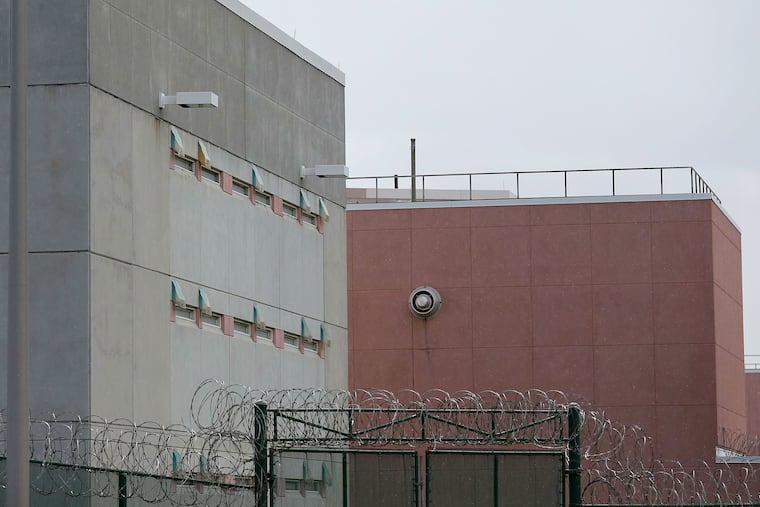Philly will test all inmates and staff as coronavirus surges in prisons
City Council grilled prisons officials about policies amid a surge in COVID-19, including charging families for virtual visits and placing inmates exposed to the coronavirus in solitary confinement.

Philadelphia prison officials pledged Monday to complete and release coronavirus test results for all inmates and staff members by the end of January after a federal judge mandated universal testing amid a surge in COVID-19 cases in city prisons.
Prisons Commissioner Blanche Carney explained the testing plans as she faced tough questions from City Council during a hearing on the coronavirus inside the prison system.
Councilmembers expressed concern about the practice of placing inmates exposed to the virus in solitary confinement and charging families for virtual visits with inmates, and about a lack of clear data on prison staff members who have tested positive for the virus.
The city’s prisons have been under shelter-in-place restrictions, allowing inmates to leave their cells only for showers and virtual visits with lawyers or relatives since earlier this month. A similar policy was in effect during a spring wave of the virus, but restrictions were eased during the summer and early fall, during which Carney said inmates were spending up to six hours a day outside their cells.
“What we’re doing now is back in shelter-in-place again with the same understanding that we have to stop the spread,” Carney told Council during the virtual hearing.
U.S. District Judge Berle M. Schiller ruled last week that the city’s prisons system must conduct universal testing of all employees and inmates, in response to a request made by the American Civil Liberties Union in a class-action lawsuit filed this spring on behalf of prisoners. Schiller ruled that further testing may also be required “on a periodic basis” as the pandemic continues. He also ordered that all inmates must get at least 45 minutes a day out of their cells while the shelter-in-place order remains in effect.
Both his ruling and the council hearing came amid the recent surge in COVID-19 cases in Philadelphia and in its prison system. As of Monday, six inmates are currently symptomatic and 35 have tested positive but are asymptomatic, according to the city’s Health Department. Since March, the city has reported 1,020 positive cases among roughly 4,300 prisoners.
» READ MORE: COVID-19 outbreak at Philly jails panics staff and prisoners ‘in the eye of the storm’
Neither Philadelphia nor Pennsylvania has required testing of prison staff members ― even as testing policies have been enacted in other states.
The city conducted universal testing of inmates in the spring, with nearly 6% of asymptomatic inmates testing positive for the virus. Carney said the city had been exploring another round of universal testing before the court order was issued last week.
Councilmembers also questioned the quarantine policies for inmates who have been exposed to the coronavirus.
Councilmember Cindy Bass said it is “totally and completely unacceptable” to place prisoners in solitary confinement simply because they were exposed to someone with COVID-19. She said the practice is punitive and has a psychological impact on those placed in confinement.
“I have great concern of folks who are being moved into solitary who have done nothing wrong other than being exposed to this virus,” Bass said.
Carney defended the practice.
“Right now, with that increased infection in our facilities, it does seem punitive, but it was our only option at that point to stop the spread of the virus,” she said.
Keir Bradford-Gray, chief of the Philadelphia Defenders Association, told Council members that quarantine and isolation policies inside prisons are not always followed. She cited an example of a public defender who went to visit a client and was informed only by that client that he had tested positive for the coronavirus. The inmate should not have been brought into the visitation area, she said, and the defender had to self-quarantine following the exposure.
The only way to reduce risk in a meaningful way, Bradford-Gray said, is to “reduce overcrowding at facilities and strictly limit the population.”
The hearing also included testimony from prison employees and union officials who said there has been insufficient access to personal protective equipment, a lack of contact tracing when colleagues test positive for the virus, and limited enforcement of safety measures. Carney defended her department, but said she would look into some of the complaints.
Under the shelter-in-place order, family members may not visit inmates in person. Carney said virtual visits are available, although Council members questioned why families are charged 25 cents a minute, or $7.50 for 30 minutes.
Carney said the Department of Prisons does earn some money from the calls, which is reinvested into programs for inmates.
Councilmember Allan Domb offered Monday to work with the city to cover the cost of those virtual visits.
“I’d be happy to donate $10,000 of my own money for you not to charge for the next two months,” he said.